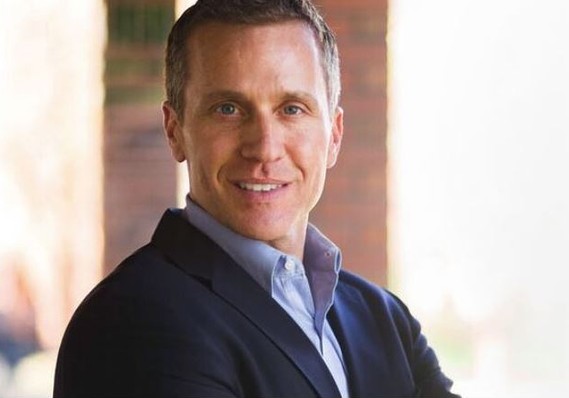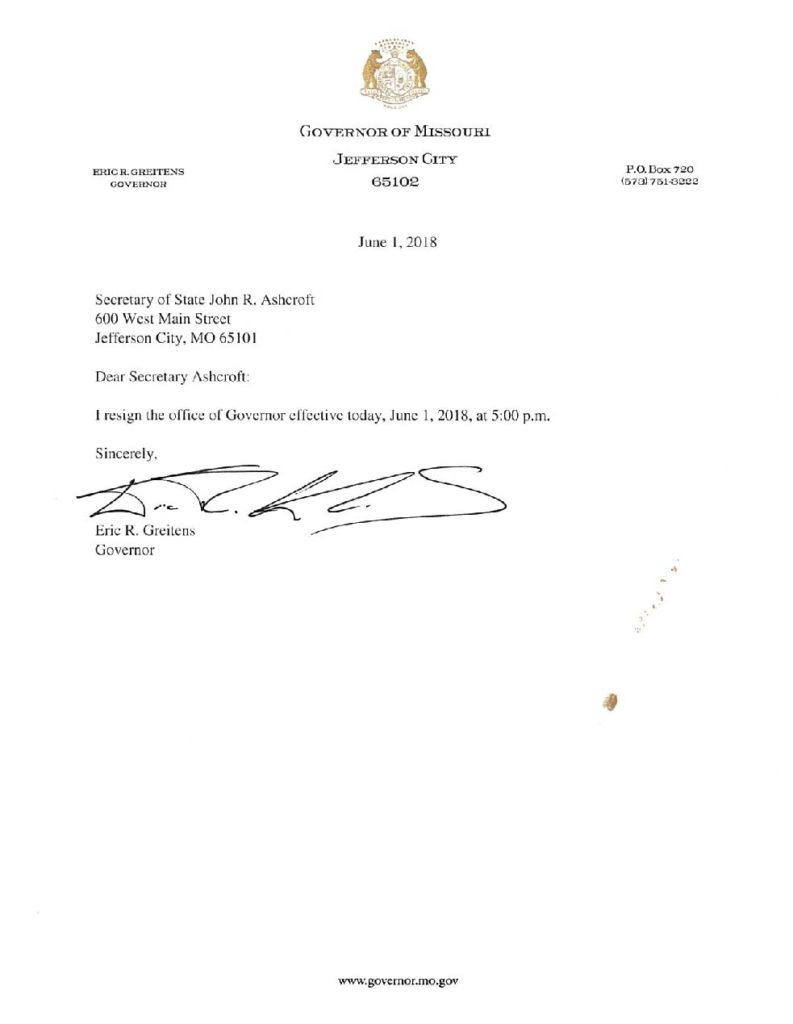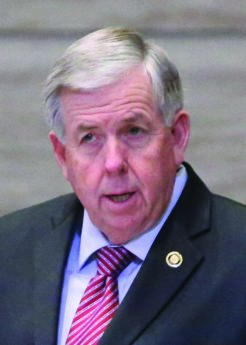HOME | ABOUT US | MEDIA KIT | CONTACT US | INQUIRE
HOME | ABOUT US | MEDIA KIT | CONTACT US | INQUIRE

Barely 16 months after it began, the Eric Greitens Era in Missouri political leadership came to an abrupt halt this month with a single line of text delivered to Secretary of State Jay Ashcroft: “I re-sign the office of Governor effective today, June 1, at 5:00 p.m.”

For roughly half an hour, until Lt. Gov. Mike Parson took the oath of office to succeed Greitens at 5:33, the state was, in effect, rudderless. In truth, it had been in that condition since Jan. 11, shortly after delivery of Greitens’ State of the State address. Within hours came the first allegations that Missouri’s chief executive—he of clean-cut, family-man image—had engaged in a 2015 affair with a woman and had, prosecutors would later claim, threatened to distribute a photo of the woman partially clad if she didn’t maintain her silence about it.
For all practical purposes, the Greitens Agenda went into the deep freeze. Any doubt of that was dispelled a few weeks after the sex-scandal broke, with fresh allegations that Greitens had improperly used a donor list from the foundation he had started to assist veterans, and tried to leverage them for political gain during his 2016 campaign for office. Though he dod-ged an impeachment bullet with lawmakers who assembled for special session to consider his ouster on the sex charges, Greitens could still face legal peril on both fronts. And yet, the 2018 session of the General Assembly was not without its achievements, particularly with regard to the state’s economic health. Among them:
For businesses, there was a reduction in the corporate tax rate, taking it from 6.25 percent to 4 percent, effective in 2020.
For other taxpayers, there was a doubling of the state’s standard deduction on individual income taxes. That will head off a hidden tax increase that would have taken place because of federal tax reforms passed last December.
For the state’s fiscal position, the General Assembly fully funded the Missouri State Employers Retirement System. That won’t completely avert looming challenges that confront the state’s ability to make good on its legal obligations to retirees, but it will make it easier.
While there wasn’t much to give executives on college campuses reason to smile, they did get back money that had been withheld by Greitens and saw additional education cuts reversed at that level. Lawmakers also pointed to record funding for K-12 as a key factor in the state’s future work-force development efforts. For the first time in state history, the K-12 Foundation Formula is fully funded for two consecutive years.
Restoring Ties
Given that the General Assembly nearly doubled the legislative output of 2017 by passing nearly 150 pieces of legislation this year (Greitens signed close to 75 of them on his final day in office), it’s hard to argue that the Greitens situation hampered the body’s ability to do business.
But to Mike Parson falls the task of rebuilding relations between the executive and legislative bodies of state government. For all of Greitens’ appeal to voters as someone who could bring a fresh approach to governing in Jefferson City, his message implicitly ruffled the feathers in an assembly that has become increasingly dominated by Republicans over the past generation. After all, you can’t expect to be greeted with open arms in the Capitol if you go there by pushing a “Throw-the-Bums-Out” message at voters—especially if the party in power is your own. That, lawmakers across party lines say, is where a legislative veteran like Mike Parson will make a difference and pick up the tempo on improving business conditions in Missouri. Parson himself concurred. “We have an opportunity beginning today for a fresh start in state government,” he said after taking the oath of office. “There are many, many common grounds for the state of Missouri, such as infrastructure and work-force development. My purpose for being the governor will be to try to bring people together to try and move the state of Missouri forward for what’s best for the state of Missouri.”

Missouri Governor Mike Parson
That was music to lawmakers’ ears. “The advantage with Mike in office is that he has a done a lot of relationship-building across the state,” said Mike Kehoe, majority leader in the Senate. “His time as lieutenant governor has been just 16 months or so, but his role in the legislative community and statewide initiatives he has pushed gave him great exposure around the state. Not only great relations on both sides, but with the business community and the agricultural community. He’ll be able to parlay those relationships and do what Mike has done for the eight years I’ve known him: Figure out solutions and go forward.”
Of Note in Kansas City
Perhaps the biggest difference for the Kansas City region in the immediate post-Greitens era is the potential to resurrect the longtime dream of some in the civic community to bring the UMKC Conservatory of Music and Dance to a downtown campus. That not only would leverage the world-class asset just across the street from the proposed site, the Kauffman Performing Arts Center, it would add further density needed to keep Downtown redevelopment on track. As many as 1,000 university employees and students could be thrust into the mix if the move is made.
Greitens, however, dashed a lot of hopes during his first months in office when he vetoed $48 million in state bond funding for the project. That came in the face of bipartisan support for the measure, and it took off the table money that civic leaders had been counting on to match an identical sum raised by UMKC, including $20 million promised by the Muriel McBrien Kauffman Foundation. After the veto, that pledge was withdrawn. It was the kind of “My-Way-or-the-Highway-Move” that critics say Greitens was too willing to apply to his term, even if it meant hurting people in his own party. Already, civic leaders are hoping to sound out Parson and secure his support for the initiative.
Kehoe said he’s hoping to push ahead in the next session additional tort reforms and a measure that would end judge-shopping by civil-lawsuit plaintiffs’ attorneys, and perhaps add to the foundation of tax-cutting efforts laid this year. “The corporate tax-cut bill was our No. 1 accomplishment, being able to lower that rate to 4 percent,” he said. “That’s still higher than I want, but out of all the states that charge a corporate tax, Missouri is now the second-lowest. Being able to make that sign on the state’s door that says we’re not only open for business, but we’re the most favorable state, not only for existing business, but those looking to move—that’s a huge step.”
It will take longer, lawmakers said, to assess the full impact of national headlines attached to a Republican governor’s sex scandal and legal challenges. “Unfortunately, those challenges for the state with issues surrounding the governor were not helpful to the national view of Missouri, but that chapter is behind us,” Kehoe said. “Mike Parson is stepping in and he’ll do what he knows best: Working with the House, the Senate and agricultural leaders. We’re going to continue to grow, prosper and have opportunities for citizens with his leadership—I’m very excited about that.
“I think that’s what people will be talking about a month from now, as opposed to what they were talking about a month ago.”